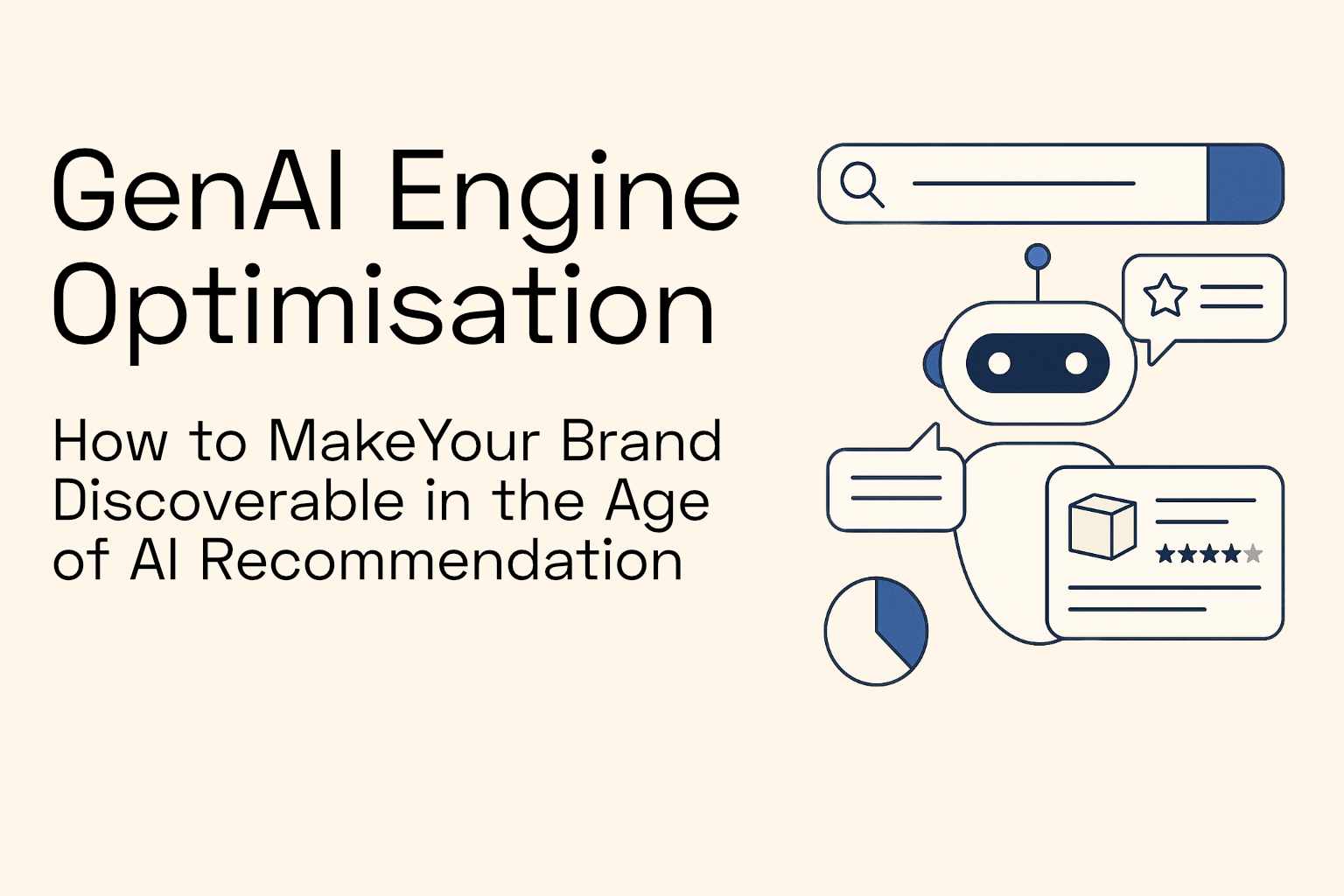How to Make Your Brand Discoverable in the AI Recommendation Era + Bonus Prompt
Direct-to-Consumer (DTC) subscription brands face a shifting landscape in product discovery. Customers no longer rely solely on Google searches or Instagram feeds—they’re turning to AI tools like ChatGPT, Google’s Gemini, and Amazon’s Rufus for personalised recommendations.
If a customer asks, “What’s the best subscription box for dog treats?”—will your brand be recommended? GenAI Engine Optimisation (GenAI-EO) ensures it is.
What Is GenAI Engine Optimisation?
GenAI-EO is the process of optimising your brand’s online presence to be accurately referenced, recommended, or summarised by generative AI systems. Unlike traditional SEO, which focuses on search engine rankings, GenAI-EO targets AI-generated responses that drive product discovery.
Why GenAI-EO Matters for Subscription Brands
AI as a Discovery Channel: Millions use GenAI tools for product research, from subscription boxes to meal kits.
Limited Answer Slots: AI often delivers one or two recommendations, not a list of options, making precision critical.
Beyond Keywords: AI prioritises relevance, context, and structured data over keyword stuffing.

5 Proven Strategies to Optimise Your Subscription Brand for GenAI
Craft Clear, Structured Content
AI models favour concise, factual, and well-organised content.Clearly define your subscription’s value proposition.
Specify your target audience and unique differentiators.
Example: “PetCrate delivers a monthly subscription box for dog owners, offering vet-approved natural treats, durable toys, and grooming essentials tailored to your dog’s breed, size, and dietary needs.”
Distribute Content on AI-Indexed Platforms
AI systems pull insights from trusted, high-authority sources.Publish guest posts on reputable blogs, forums, and marketplaces.
Engage in Substack newsletters, Reddit discussions, or Quora threads relevant to your niche.
Secure spots in curated lists like “Top 10 Pet Subscription Boxes” on review sites.
Leverage Structured Data for AI Crawlers
Make your website AI-friendly with structured data.Implement schema.org markup for subscription products, including fields like productType, price, subscriptionFrequency, and customerReviews.
Add structured FAQs and summaries to clarify your offerings.
Example: Tag your product as a “Monthly Pet Subscription Box” with detailed attributes.
Ensure Consistent Brand Messaging
AI infers your brand’s identity from its online footprint.Use consistent phrases like “monthly subscription box for [target audience]” across your website, social bios, and press releases.
Avoid vague or overly creative descriptors that may confuse AI models.
Monitor and update outdated or inconsistent listings on third-party platforms.
Test and Refine AI Responses
Regularly query GenAI platforms to assess your brand’s visibility:“Best subscription box/club for [your industry]”
“Affordable [product type] subscription for [target audience]”
“Alternatives to [competitor’s brand]”
If your brand is missing or misrepresented, refine your content, messaging, or distribution strategy.
The Opportunity for DTC Brands
Generative AI is a powerful gateway to new customers. By optimising for GenAI-EO, your subscription brand can stand out in AI-driven recommendations, building trust and driving conversions. Most DTC brands are not yet AI-optimised—early adopters gain a competitive edge.
Bonus Prompt
If you are a brand that creates blog posts and includes storytelling & brand tone, the following is a great prompt that will optimise your posts, but won’t strip out all the good content. Like anything, tailor this to suit your specific needs and update the content in bold for your brand:
Introduce [Brand Name], the product type (e.g., sustainable sneakers, productivity software), target audience (e.g., eco-conscious millennials, small business owners), and key benefits within the first paragraph, weaving them into a compelling narrative hook derived from the original content.
Preserve the storytelling by retaining or enhancing existing anecdotes, customer scenarios, or vivid details that reflect [Brand Name]’s values and mission, while ensuring the narrative supports the product’s benefits.
Restructure the content with 3-5 clear, descriptive headers to make it scannable for AI and readers. Ensure each section delivers a key insight or benefit that AI can extract.
Incorporate at least one bulleted or numbered list to summarise benefits, features, or steps, ensuring it feels natural within the narrative and is drawn directly from the original content.
Use fact-based language to highlight product features, benefits, or data from the original content (e.g., ‘reduces carbon footprint by 30%’ or ‘used by 10,000+ teams’) without losing the emotional or brand-specific tone.
Avoid generic intros, filler content, or jargon that dilutes the story or brand personality.
Optimise for SEO and AI discovery by naturally weaving in relevant keywords from the original content (e.g., [list 2-3 example keywords like ‘sustainable fashion’ or ‘project management tools’]) without forcing them.
Keep the rewritten post within [desired word count, e.g., 10-20% shorter than the original or a specific range like 600-800 words].
End with a clear call-to-action aligned with the brand’s goals (e.g., ‘Shop now’, ‘Start your free trial’) based on the original content’s intent.
Example Output Style: Blend a storytelling piece (like Airbnb’s community-driven blog posts) with a product-focused explainer (like Slack’s clear, benefit-driven guides), tailored to [Brand Name]’s voice and audience, using only the provided content.
Get Started with GenAI-EO
Ready to make your subscription brand AI-discoverable? Our team specialises in AI-era growth strategies for DTC brands. Contact us to elevate your brand’s visibility.

Chris Mulhallen
CRU Subscription Agency - Owner
Join me on LinkedIn for subscription and eCommerce content


